In 2020, the study of well-being took on new meaning. The COVID-19 pandemic created a mental health crisis that is affecting people in all corners of the globe. In the United States, Americans have faced intense political polarization and a reckoning around racial justice. Many of us are left wondering how we can move forward toward a better future.
As the year rolled on, some well-being researchers were quick to turn their lens on the pandemic itself, tracking how people were doing and testing ways to help us cope better. Others continued to study how we can connect, bridge our differences, and build more just communities.
This year’s top insights speak to the moment, from concrete tips about how to bond with a friend to broader truths about how societies respond to diversity over time. All of them point toward strengths and solutions amid isolation, illness, and conflict. The final insights were selected by experts on our staff, after soliciting nominations from our network of more than 300 researchers. We hope they remind you how we’re all connected—and perhaps bring you a little bit of hope.
Rich and varied experiences may be an overlooked key to a good life

When we strive for a good life, what are we actually seeking?
“Happiness” is the simple answer for many people. In general, we want to feel satisfied with life, and experience more pleasantness than unpleasantness. We also strive for meaning and purpose—the sense that we matter, belong, and are engaged in service to something beyond ourselves.
Until now, psychological science has been focused on these three dimensions of well-being, which are technically called “evaluative” (satisfaction with our lives), “hedonic” (positive and negative feelings), and “eudaimonic” (meaning in life).
Now, researchers led by the University of Virginia’s Shigehiro Oishi have proposed another dimension of well-being that has not been carefully studied yet: psychological richness.
Psychological richness involves having new, interesting experiences that promote curiosity or transform how you think. People with psychologically rich lives experience more intense emotions—positive and negative—and are more open to novelty and uncertainty. They might choose to live abroad, seek awe in nature, or explore complex intellectual problems. In contrast, the researchers suggest, happy or meaningful lives can be more routine, and possibly even boring.
In their paper, published in Affective Science, the researchers asked people from nine countries to journal freely about their ideal life. Then, the researchers asked them to analyze it: How happy, meaningful, or psychologically rich was it? The ideal life they envisioned tended to be very happy and meaningful, but also moderately eventful, interesting, and surprising—in other words, psychologically rich.
When people were forced to choose between the three types of ideal lives, most chose a happy or meaningful life—but 7-17% of people chose a psychologically rich life.
To get another window into people’s greatest aspirations for their life, the researchers surveyed people from the United States and Korea about their biggest regret. Here, 28% of Americans and 35% of Koreans said their lives would be psychologically richer (rather than happier or more meaningful) if they could undo this regret, suggesting that psychological richness is a dominant life goal for them.
These studies offer clues about a key value we hold that may not be captured by common conceptions of happiness or meaning—it has more to do with adventurous and thrilling experiences. “Taking the psychologically rich life seriously will deepen, broaden, and, yes, enrichen our understanding of well-being,” the researchers write.
If you want to connect with someone, call rather than text

As the pandemic isolates us from loved ones, many of us are trying to stay connected through texting, email, and social media, even taking the opportunity to reconnect with long-lost friends.
But if our goal is to feel closer to people and enjoy our conversations more, we’re best off picking up the phone, according to a new study published in the Journal of Experimental Psychology. There seems to be something special about hearing another’s voice that makes for more satisfying social interactions.
In the study, participants imagined having a conversation with a friend they hadn’t been in touch with for at least two years and made predictions about how it would feel to connect by phone versus email.
After being randomly assigned to connect with their old friend via phone or email, they reported back on the experience. Though most people thought talking by phone would be more uncomfortable, those who spoke on the phone were happier with the exchange, felt closer to the other person, and felt no more uncomfortable than those who’d emailed—even if they had preferred to email.
“We think it’s going to be awkward to talk to somebody, but that just turns out not to be the case,” says lead author Amit Kumar. “Instead . . . people form significantly stronger bonds when they’re talking on the phone than when communicating over email.”
The same result held true when the researchers had participants do a conversation exercise with strangers using either video chatting, audio-only chatting, or text-chatting. People who used media that included the voice had more satisfying exchanges and felt closer to their new acquaintance than the text-chatters.
Why? Likely it’s because our voices communicate a wide range of emotions, helping others to read us better and to feel like they really know us. Hearing someone’s voice enhances our empathy for them, too—in some cases, even more than video chatting.
So, while texting can be useful, it’s not the best way to get the most out of socializing. If we’re looking for greater happiness and connection, we should give someone a call.
Acting like an extravert can make you happier
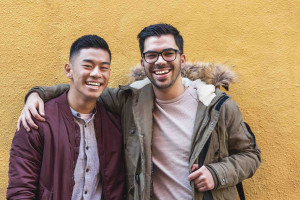
Forty years of research has found that introverts tend to experience less frequent positive emotions than extraverts. Does that mean they’re doomed to be less happy than their bubbly, loquacious counterparts?
Not necessarily. In fact, a paper in the Journal of Experimental Psychology: General suggests that anyone can experience some of the benefits of being an extravert. All you have to do is act like one.
Researchers Seth Margolis and Sonja Lyubomirsky asked 131 undergraduate students, mostly Asian and Latino, to spend one week behaving like an extravert and one week behaving like an introvert (or vice versa). Acting like an extravert meant being talkative, assertive, and spontaneous, while acting like an introvert meant being deliberate, quiet, and reserved.
Based on surveys the students completed every few days, they experienced more positive emotions and felt more connected to others, competent, autonomous, and in “flow” during the extravert week compared to the introvert week.
This was true of both introverts and extraverts alike (although in the one previous study where people acted extraverted for a week, introverts didn’t benefit as much). The relationship was even stronger for people who wanted to be more extraverted, and for Latino students—perhaps, the researchers speculate, because extraversion is valued more in their culture.
As an introvert, you might object to the implication that to be happier, you shouldn’t be yourself. But the researchers take a more flexible view of personality and behavior than that. Research suggests that our personality can change over time, and how introverted or extraverted we act can vary week to week. Although introverts usually don’t believe acting extraverted will make them happier, it usually does.
At the very least, it can be something to experiment with—the same way you might try gratitude journaling even though you aren’t naturally very grateful. You don’t have to be the life of the party or spend all your free time on Zoom; you just have to try expressing yourself and engaging more with others.
After all, many extraverted behaviors involve connection—and research suggests that relationships are one of the most fundamental keys to happiness.
Cooperating with each other may encourage kids to work harder
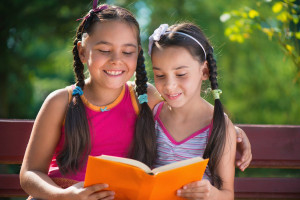
It’s a message many kids get from the time they’re young: If they want to succeed in life, they need to look out for themselves.
But in January, a study published in Psychological Science challenged that conventional wisdom, suggesting that kids are more likely to achieve a goal if they know that someone else is relying on them.
In the study, researchers had two five- or six-year-old children meet and do a shared task before separating them into different rooms. Then, before leaving the room, the researcher left a cookie in front of each child and told them they’d get two cookies if they could resist eating the first one. In some cases, the children were told that they and the other child both needed to resist the cookie to get the bigger reward.
The researchers found that kids who were cooperating to earn the reward were able to resist longer than those who only had to think about themselves—even though counting on another child meant less chance for reward.
“In situations where individuals mutually rely on one another, they may be more willing to work harder in all kinds of social domains,” says Sebastian Grueneisen, a coauthor of the study.
Interestingly, the kids in this study came from two very distinct cultures—the Western democracy of Germany and a small farming community in Kenya—with different values around independence and interdependence. This suggests that cooperation may be universally motivating when it comes to delaying personal gratification.
Given that resisting temptation is a vital skill across so many situations in life—from persevering at school to avoiding addictions—these findings suggest we should encourage kids to work together cooperatively more, for the benefit of all.
For a more empathic world, we need to choose empathy
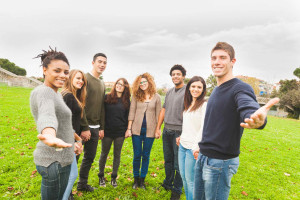
Most of us think about empathy as an automatic response, like a parachute that deploys when we see someone in distress. Or we think of it as a skill, something we can hone by practicing perspective taking or deep listening.
But a new study suggests a missing piece of the empathy puzzle: motivation. Even when we have the ability to feel others’ pain or understand their perspective, we’re more likely to exercise it when we have a strong desire to do so.
This finding is especially relevant today amid all the social and political divides in the U.S. In addition to teaching people skills to bridge differences, this research suggests we also need to boost their motivation to empathize in the first place—and it points to a few ways to do so.
Harvard University social psychologist Erika Weisz and her team instructed college freshmen to write letters to struggling high school students about how empathy was in the high-schoolers’ best interest—that it would help them connect with others, for instance. This activity was designed to boost the letter-writers’ own motivation to empathize, Weisz explains. “When we ask a participant to endorse a statement to another person, they tend to endorse those beliefs themselves.”
After they wrote the letters, the students seemed to get better at reading other people’s emotions. Up to two months later, they showed higher accuracy when asked to describe what people in a video were feeling, compared to a control group who wrote letters unrelated to empathy. Some also reported making more close friends at college, possibly due to their empathic savvy.
Along the same lines, a University of Toronto study this year reiterated the finding that our empathy depends on our motivation and explored other ways to boost our identification with people.
Results like these suggest that we can encourage empathy by focusing on the rewards it offers. “A lot of people think of empathy as a static trait,” Weisz says. “Targeting motivations imparts lasting changes.”
Witnessing gratitude and kindness helps bond people together

Gratitude is a premier emotion for bonding two people together. It creates a warm feeling of trust, encouraging more closeness and care.
But a study published this year in the Journal of Personality and Social Psychology suggests that these effects extend beyond the people involved in an exchange of thanks—all the way to people who only observe expressions of gratitude.
In the study, Sara Algoe and her colleagues ran a series of experiments. Sometimes, participants saw written notes of thanks for a kindness done; other times, they watched a video of someone voicing how grateful they were for another person’s kindness and fine qualities.
In both cases, when people observed these expressions of gratitude, they were drawn to befriend the grateful person and the recipient of the gratitude, and they wanted to help them out, too. This suggests that gratitude can encourage ripple effects of positive social connection within communities.
“A whole group of people could be inspired to be kinder to one another,” says Algoe, “and through this interwoven kindness, the group itself could become a higher-functioning group.”
And witnessing kindness can have a similar effect, according to another study published this year in Psychological Bulletin.
In the study, Haesung Jung and her colleagues analyzed decades of experimental studies. The researchers found that being a bystander to kindness—whether we read about it or see it happen in front of us—makes us act kindly ourselves, even toward people not involved in the act of kindness.
“People resonate when they watch someone do something good,” says Jung. “The message that these prosocial behaviors are quite contagious is a really important message that people should know.”
Both studies suggest we should all try expressing more gratitude and being kinder to one another. Doing so has more far-reaching effects than we may have realized, helping to spread goodness and build greater social cohesion in our communities.
To get people to follow COVID guidelines, appeal to their care for others

The world is facing another surge in COVID-19 cases and related deaths. To effectively stop it requires more people to adhere to public health guidelines, including wearing masks and keeping physically distant—at least until a vaccine is widely available.
But how do we get people to comply with these measures? While it might seem that people would be most motivated to protect their own health, research suggests that isn’t necessarily the case. Instead, messages that appeal to our concern for others may be more effective.
In one study published this year, Harvard researcher Jillian Jordan and her colleagues compared how a large group of Americans responded to different public health announcements during the early months of the pandemic. She found that messages focusing on the need to protect others were more likely to inspire compliance with health measures than those focused on the need to protect oneself—a finding that resonates with prior studies.
“While people do care a great deal about themselves and are self-interested, people also care a lot about other people, and those social motivations are a big part of our behavior,” says Jordan.
Indeed, a study conducted in Sweden concluded that people who were more “prosocial” (kind and helpful, measured two years before the pandemic hit) were more likely than less prosocial people to follow distancing guidelines, stay home if sick, and buy face masks during early 2020.
Many other social factors drive us to follow health safety guidelines, too—including the compliance of those around you (social norms) and your social identity (especially your political identity—in the United States, at least). But our instinct for altruism is strong, if it’s tapped. That’s especially true when the outcome of our actions is uncertain but could hurt other people’s well-being.
That’s why many scientists are recommending that leaders always mention the importance of protecting others whenever they ask people to wear a mask, keep their distance from others, or take other precautions to prevent the spread of COVID. Doing so could encourage more people to take those steps—and help end the pandemic sooner for everyone.
We might care more about inequality if we question our underlying assumptions about poverty
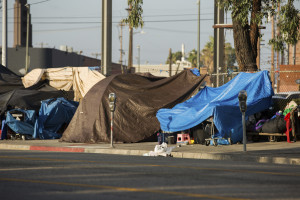
Why in the world would anyone be for economic inequality, given how harmful it is to individuals and societies?
According to a new paper published this year in Nature Human Behavior, it comes down to “people’s judgments about why the poor are poor”—and the belief that inequality accurately reflects how hard individuals work.
First, Paul Piff and his colleagues surveyed people from 34 countries about whether they attributed poverty to unfairness in society (situational causes) or to laziness or lack of willpower (dispositional causes).
As the researchers expected, people who thought of the poor as lazy believed they deserved to be poor—and that the rich deserved to be rich, because they were so hard-working. According to another survey of Americans, the researchers found that situational and dispositional causes were not mutually exclusive in people’s minds. In other words, people could believe in both—and other research, cited in the paper, suggests that they’re often not even aware that they have these assumptions about poverty.
Next, the researchers conducted three experiments to see if they could stimulate people’s awareness about their own attributions and how that awareness could, in turn, affect their behavior. In the first experiment, they asked a geographically diverse group of about 1,000 American adults to simply write about people who are poor—or to write about why some people might not deserve to be poor. Primed to think about poverty and its causes, participants had the option to donate all, some, or none of their winnings in a raffle to a minimum-wage campaign.
Indeed, those who had been invited to think about the situational causes of poverty—such as racism, lack of education, or childhood trauma—were more likely to make the donation, and to express support for measures against inequality.
Taken together, the studies suggest that people can shift toward looking at poverty less as a failure of will and more as the result of social forces—but they need to be made aware of those forces through education and they need the opportunity to reflect on their own assumptions.
Social justice and individual happiness go hand in hand
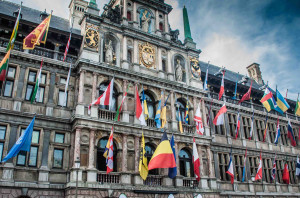
This year, millions of people around the world took to the streets to protest the murders of George Floyd, Breonna Taylor, and other Black Americans. One of the most striking things about the protests was the diversity of who participated in them: They engaged people young and old, of all different races and ethnicities, in large cities and small towns. More people than ever seemed to feel that the movement was relevant to them, even if they themselves hadn’t been the victim of racial injustice.
A study published in early July, around the time that the protests were at their peak, suggests that they’re right, in ways that they may not have fully realized. For while it’s clear that a society should value social justice for its own sake, the study suggests that everyone benefits when societies are fairer. It turns out that countries with the highest levels of social justice have the happiest citizens, too.
In the study, published in the Journal of Community Psychology, researchers Salvatore Di Martino and Isaac Prilleltensky looked at social justice levels in 28 European countries. Indicators of social justice included equity around education and health care for ethnic minorities and the poor, non-discrimination policies, gender representation in government, and more.
The researchers then compared that data to how satisfied Europeans were with their lives, based on interviews with nearly 170,000 individuals. After ruling out other factors that might influence happiness—like age, gender, occupation, or a country’s gross national product—they found that living in a more socially just society was the second most important contributor to individual happiness. It only lagged in importance behind social capital—the strength of people’s relationships, trust in institutions, and civic engagement.
“Social relations are important for people’s happiness—one of the most important things,” says Di Martino. “But people should also realize that the conditions surrounding them—like living in a place that gives them opportunities or resources—are also very important.”
Building upon other research showing the importance of good governance and the role of social equity in personal happiness—even for the well off—this study bolsters the case that social equality matters to us all.
Living in diverse communities may reduce stereotypes—and improve well-being
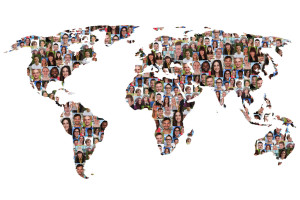
More people around the world are living with more diversity than ever before, thanks to immigration and globalization. In a new paper published in June in PNAS, psychologists Xuechunzi Bai, Miguel R. Ramos, and Susan T. Fiske provide us with a hopeful message about the long-term prospects of diversity.
Their question: How does experiencing ethnic diversity change the stereotypes people hold? To find out, they ran a series of studies across over 12,000 people in 47 countries, including all 50 U.S. states. Across the board, they found that people in more homogeneous areas were much more likely to harbor stereotypes about people different from them, seeing them as less warm and competent. On the other hand, they write:
Countries and U.S. states with higher levels of ethnic diversity (e.g., South Africa and Hawaii, versus South Korea and Vermont), online individuals who perceive more ethnic diversity, and students who moved to more ethnically diverse colleges mentally represent ethnic groups as more similar to each other.
The paper highlights another bonus that comes with the decline in stereotypes: greater well-being. In the studies of Americans and students, they found that people in diverse communities both held fewer stereotypes and reported being more satisfied with their lives.
Why? That’s hard to say. There is some research that finds that diversity stresses us out if we don’t feel it’s a good thing. The researchers speculate that experiencing diversity also just broadens our horizons. A study from last year, for example, found that religious diversity provokes more conflict in the short run—but over time, people get used to the differences and learn to live with each other.
As ever, we need more research. But in the meantime, we can take hope from the implications of their result: “Individuals have in them the potential to embrace diversity—[which] should encourage societies to intervene against potential barriers to a peaceful coexistence.”



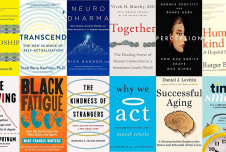




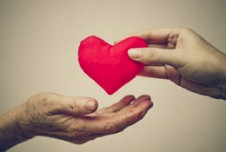
Comments